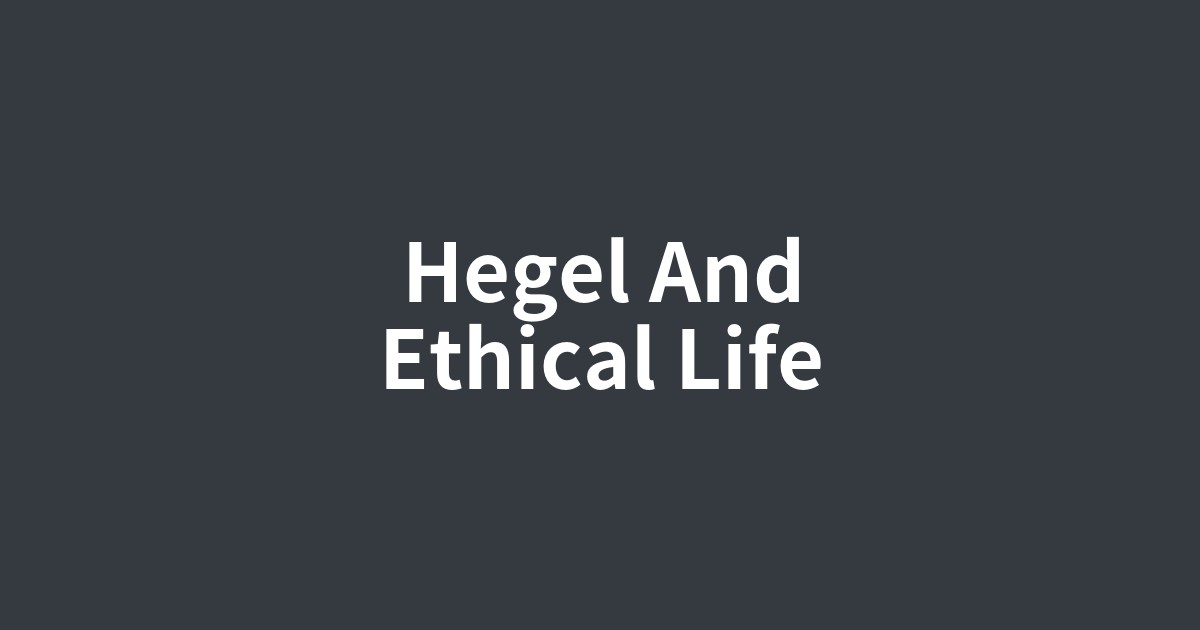このページは、歴史や文化の物語を楽しみながら、その文脈の中で重要な英単語を自然に学ぶための学習コンテンツです。各セクションの下にあるボタンで、いつでも日本語と英語を切り替えることができます。背景知識を日本語で学んだ後、英語の本文を読むことで、より深い理解と語彙力の向上を目指します。

個人は、家族を超え、市民社会を経て、国家という普遍的な共同体の中でこそ、真に自由になれる。ヘーゲルが描いたmodern state(近代国家)の理念。
この記事で抑えるべきポイント
- ✓ヘーゲルが提唱した「人倫(Sittlichkeit)」とは、個人の内面的な道徳とは異なり、家族や社会の制度・慣習に根ざした客観的な倫理のあり方を指すという考え方。
- ✓個人は「家族」の愛情、「市民社会」の利害対立という段階を経て、より普遍的な共同体である「国家」へと発展していくという、弁証法的なプロセス。
- ✓ヘーゲルにとっての真の「自由」とは、何ものにも縛られないことではなく、理性的で普遍的な共同体(国家)の中でこそ実現されるという理念。
- ✓ヘーゲルの国家論は、近代国家の理念的基礎を築いたとされる一方、国家を絶対視する思想として全体主義に繋がるという批判も受けてきたという両義性。
ヘーゲルと「人倫」の共同体 ― 家族、市民社会、国家
「自由」と聞いて、あなたは何を思い浮かべますか?多くの人が「束縛からの解放」をイメージするかもしれません。しかし、19世紀ドイツの哲学者ヘーゲルは、共同体の中でこそ人間の真の「自由(freedom)」は花開くと考えました。彼が描いた「家族」から「市民社会」、そして「国家」へと至る壮大な物語、「人倫」の世界とはどのようなものだったのでしょうか。この記事では、ヘーゲルの思想の核心に迫ります。
Hegel and the Community of "Ethical Life" - Family, Civil Society, and the State
When you hear the word "freedom," what comes to mind? Many might imagine "liberation from constraints." However, the 19th-century German philosopher Hegel believed that true human freedom blossoms within a community. What was the world of "Sittlichkeit" (Ethical Life) that he depicted—a grand narrative leading from the family, through civil society, to the state? This article delves into the core of Hegel's thought.
人倫のゆりかご:愛情の共同体「家族」
まず、ヘーゲル哲学のキーワードである「人倫(Sittlichkeit)」の概念から見ていきましょう。これは個人の内面的な道徳心とは一線を画し、共同体の制度や慣習に宿る「生きた倫理」を指します。その出発点としてヘーゲルが位置づけたのが、愛情という直接的な絆で結ばれた共同体である「家族(family)」です。個人はまず家族の一員として、共同体への帰属意識を学びます。この愛情に満ちた環境こそが、人倫が育まれる最初のゆりかごとなるのです。
The Cradle of Ethical Life: The Community of Love, the "Family"
First, let's explore the key concept in Hegelian philosophy: "Sittlichkeit," or Ethical Life. This is distinct from an individual's internal morality; it refers to the "living ethics" embedded in the institutions and customs of a community. Hegel positioned the family as its starting point—a community bound by the direct tie of love. As a member of a family, an individual first learns a sense of belonging to a community. This loving environment serves as the initial cradle where ethical life is nurtured.
欲望が渦巻く競争の舞台:「市民社会」
やがて個人は「家族(family)」という愛情の共同体から巣立ち、自己の利益を追求する「市民社会(civil society)」へと足を踏み入れます。ここでは市場経済の原理が働き、人々は互いに競争し、時に利害が衝突します。ヘーゲルはこの段階を、個々人の「特殊な(particular)」欲望が渦巻く「欲望の体系」と呼びました。しかし、彼はこれを単なる混乱状態とは見なしませんでした。法や職業組合といった制度を通じて、人々は相互に依存し合い、社会的な結びつきを形成する。これもまた、より高い共同体へと向かうための重要なステップなのです。
The Stage of Swirling Desires: "Civil Society"
Eventually, the individual leaves the loving community of the family and steps into "civil society," a realm of self-interest pursuit. Here, the principles of the market economy operate, and people compete with one another, their interests sometimes clashing. Hegel called this stage the "system of needs," a world of swirling particular desires. However, he did not see it as mere chaos. Through institutions like law and professional guilds, people become interdependent and form social bonds. This is also a crucial step toward a higher form of community.
自由の実現形態:「国家」という理念
家族の特殊な愛情と、市民社会の利己的な欲望。これら二つの段階の矛盾を乗り越え、より高い次元で統合(ヘーゲルの言葉で「止揚」)するのが「国家(state)」です。ヘーゲルにとって国家は、単なる権力機構や社会契約の産物ではありません。それは「普遍的な(universal)」理性が実現された最高の共同体であり、世界史を動かす根源的な力である「精神(spirit)」が、その発展の極致に達した姿でした。そして、真の「自由(freedom)」とは、この理性的で普遍的な国家の法に、個人が自覚的に従うことによってのみ実現されると考えられたのです。
The Realization of Freedom: The Idea of the "State"
The particular love of the family and the selfish desires of civil society. The entity that overcomes these contradictions and integrates them at a higher level (or "sublates" them, in Hegelian terms) is the state. For Hegel, the state is not merely a power structure or a product of a social contract. It is the highest community in which universal reason is realized, the ultimate form achieved by the spirit, the fundamental force driving world history. And true freedom, he argued, is realized only when an individual consciously obeys the laws of this rational and universal state.
ヘーゲル思想の光と影:現代への問いかけ
ヘーゲルの国家観は、個人を超越した共同体の理念を示し、「近代の(modern)」国家の基礎を築いたと評価される一方、その後の歴史の中で手厳しい批判にさらされました。特に「国家(state)」を絶対的な存在と見なす思想は、個人を抑圧する全体主義の理論的支柱として利用されたという側面は否定できません。しかし、彼の思想は単に危険なものとして片付けられるべきなのでしょうか。グローバル化が進む現代において、個人と共同体の関係や、「公」と「私」の境界線が揺らぐ中で、ヘーゲルが投げかけた問いは、今なお私たちに多くの示唆を与えてくれます。
The Light and Shadow of Hegelian Thought: A Question for the Modern Era
Hegel's view of the state, while praised for establishing the ideal of a community that transcends the individual and laying the foundation for the modern state, has also faced harsh criticism throughout history. It cannot be denied that his idea of the state as an absolute entity was used to justify totalitarianism that suppressed the individual. But should his thought be dismissed merely as dangerous? In our contemporary era of globalization, where the relationship between the individual and the community, and the line between public and private, are becoming blurred, the questions Hegel posed still offer us many insights.
結論
ヘーゲルが描いた「人倫」の旅路は、個人が「家族(family)」という愛情の揺りかごから、「市民社会」という競争の荒波を乗り越え、最終的に「国家(state)」という普遍的な共同体の一員となることで、いかにして真の「自由(freedom)」を獲得していくかという壮大な物語でした。彼の国家哲学は、その両義性から賛否両論を巻き起こし続けていますが、現代に生きる私たちが「自由」や「社会」について深く思考するための、豊かで刺激的な源泉であり続けていることは間違いないでしょう。
Conclusion
Hegel's journey of "Ethical Life" was a grand narrative of how an individual attains true freedom by moving from the cradle of love in the family, through the competitive storms of civil society, to ultimately becoming a member of the universal community of the state. His philosophy of the state, with its inherent ambiguity, continues to provoke both praise and criticism, but it undoubtedly remains a rich and stimulating source for us to think deeply about "freedom" and "society" in the modern world.
テーマを理解する重要単語
state
この記事の文脈では、単なる政府や国ではなく、「普遍的な理性が実現された最高の共同体」というヘーゲル独自の、極めて理念的な意味で使われます。この特殊なニュアンスを捉えることが、ヘーゲル思想の光と影を理解する前提となります。
文脈での用例:
The government has a duty to protect the welfare of the state.
政府には国家の福祉を守る義務がある。
particular
この記事では、市民社会における個々人の利己的な欲望を「特殊な」ものとして表現するために使われています。これは、後に登場する国家の「普遍的な(universal)」理性と対比され、ヘーゲルの弁証法的な思考のプロセスを理解する上で鍵となります。
文脈での用例:
Hegel described civil society as a system of particular desires.
ヘーゲルは市民社会を特殊な欲望の体系と表現した。
spirit
ヘーゲル哲学において、世界史を動かし、自己を展開させていく根源的な力を指す壮大な概念です。国家は、この「精神」がその発展の極致に達した姿とされています。彼の歴史哲学と国家観のスケールの大きさを理解するためのキーワードです。
文脈での用例:
The team showed great spirit even when they were losing.
そのチームは負けている時でさえ、素晴らしい精神力を見せた。
integrate
この記事では、国家が家族の愛情と市民社会の利己心という対立する要素を「統合する」働きを持つと説明されています。これはヘーゲルの言う「止揚(sublate)」の働きを分かりやすく表現した言葉で、彼の思考の動きを掴むのに役立ちます。
文脈での用例:
The new software integrates seamlessly with your existing systems.
その新しいソフトウェアは、既存のシステムとシームレスに統合されます。
freedom
この記事の中心テーマです。一般的に「束縛からの解放」を意味しますが、ヘーゲルは共同体の理性的で普遍的な法に自覚的に従うことこそが真の「自由」だと考えました。この特殊な定義を理解することが、彼の哲学の核心に迫る鍵となります。
文脈での用例:
They fought for their freedom against the oppressive regime.
彼らは圧政的な政権に対して自由のために戦いました。
universal
市民社会の「特殊な(particular)」利害を超越し、共同体全体の理性を体現する存在としての国家を特徴づける形容詞です。この「普遍性」こそが、ヘーゲルが国家を最高の共同体とみなし、真の自由が実現される場と考えた理由です。
文脈での用例:
The desire for happiness is a universal human feeling.
幸福への願いは、人類に普遍的な感情である。
community
この記事は、ヘーゲルが描いた「家族」「市民社会」「国家」という三つの共同体の発展段階を論じています。個人が孤立して存在するのではなく、共同体の中でこそ成長し自由になるというヘーゲル思想の根幹をなす概念であり、その理解は不可欠です。
文脈での用例:
He is a well-respected member of the local community.
彼は地域社会で非常に尊敬されている一員です。
institution
市民社会が単なる混乱に陥らない理由として、ヘーゲルが法や職業組合といった「制度」の役割を重視したことを理解する上で重要な単語です。共同体を支える具体的な仕組みや慣習を指し、Sittlichkeit(人倫)が宿る場所とも言えます。
文脈での用例:
Marriage is a social institution that exists in almost every culture.
結婚は、ほぼ全ての文化に存在する社会的な制度です。
ambiguity
ある事柄が二つ以上の意味に解釈できる状態を指します。ヘーゲルの国家哲学が、一方では近代国家の基礎と評価され、他方では全体主義の根拠と批判されるという「両義性」を持つことを的確に表現しています。彼の思想の複雑さを理解するのに役立ちます。
文脈での用例:
The inherent ambiguity in his philosophy of the state continues to provoke debate.
彼の国家哲学に内在する両義性は、今なお議論を巻き起こし続けている。
transcend
「~を越える」という意味ですが、ここでは単に物理的に越えるのではなく、ある限界や次元を乗り越えて、より高いレベルに到達するというニュアンスで使われます。個人という存在を超えた共同体としての国家の理念を説明する部分で効果的に用いられています。
文脈での用例:
The beauty of the music seems to transcend cultural differences.
その音楽の美しさは文化の違いを超えるようだ。
totalitarianism
ヘーゲル思想の「影」の側面、つまり歴史における負の遺産を論じる上で欠かせない政治用語です。国家を絶対視する彼の思想が、個人の自由を抑圧する全体主義の理論的支柱と見なされたという、手厳しい批判内容を理解するために必要です。
文脈での用例:
The novel depicts a society crushed under the weight of totalitarianism.
その小説は全体主義の重圧の下で打ちのめされた社会を描いている。
sittlichkeit
ヘーゲル哲学の最重要キーワードで、「人倫」と訳されます。個人の内面的な道徳心とは異なり、家族や国家といった共同体の制度や慣習に宿る、客観的で「生きた倫理」を指します。この記事で描かれる壮大な物語の出発点となる概念です。
文脈での用例:
Sittlichkeit, or 'Ethical Life', is a key concept in Hegelian philosophy, distinct from individual morality.
人倫(Sittlichkeit)、すなわち「倫理的生活」は、個人の道徳とは一線を画すヘーゲル哲学の鍵概念です。
civil society
家族と国家の中間に位置する、経済活動を中心とした領域を指す専門用語です。ヘーゲルは、人々が自己の利益を追求する「欲望の体系」と呼びました。この段階の矛盾を国家がどう乗り越える(止揚する)かが、記事の論理展開の重要なポイントです。
文脈での用例:
In Hegel's view, civil society is a realm of competition and conflicting self-interests.
ヘーゲルの見解では、市民社会は競争と利害対立が渦巻く領域である。
sublate
ヘーゲルの弁証法における「止揚」を意味する最重要の専門用語です。ある段階の矛盾を単に否定・破壊するのではなく、その本質を保存しつつ、より高い次元へと高めるという複雑な概念を示します。記事の核心的な論理展開を理解する上で不可欠です。
文脈での用例:
In Hegelian terms, the state sublates the earlier stages of social development.
ヘーゲル用語では、国家はそれ以前の社会発展の段階を止揚する。